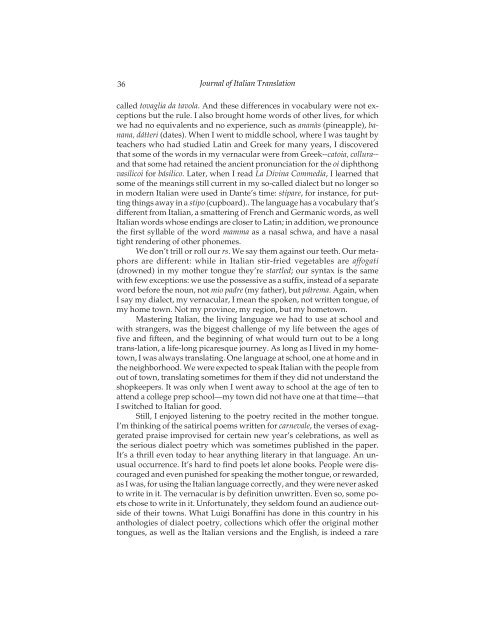Journal of Italian Translation
Journal of Italian Translation
Journal of Italian Translation
Create successful ePaper yourself
Turn your PDF publications into a flip-book with our unique Google optimized e-Paper software.
36<br />
<strong>Journal</strong> <strong>of</strong> <strong>Italian</strong> <strong>Translation</strong><br />
called tovaglia da tavola. And these differences in vocabulary were not exceptions<br />
but the rule. I also brought home words <strong>of</strong> other lives, for which<br />
we had no equivalents and no experience, such as ananàs (pineapple), banana,<br />
dátteri (dates). When I went to middle school, where I was taught by<br />
teachers who had studied Latin and Greek for many years, I discovered<br />
that some <strong>of</strong> the words in my vernacular were from Greek--catoia, collura-and<br />
that some had retained the ancient pronunciation for the oi diphthong<br />
vasilicoi for básilico. Later, when I read La Divina Commedia, I learned that<br />
some <strong>of</strong> the meanings still current in my so-called dialect but no longer so<br />
in modern <strong>Italian</strong> were used in Dante’s time: stipare, for instance, for putting<br />
things away in a stipo (cupboard).. The language has a vocabulary that’s<br />
different from <strong>Italian</strong>, a smattering <strong>of</strong> French and Germanic words, as well<br />
<strong>Italian</strong> words whose endings are closer to Latin; in addition, we pronounce<br />
the first syllable <strong>of</strong> the word mamma as a nasal schwa, and have a nasal<br />
tight rendering <strong>of</strong> other phonemes.<br />
We don’t trill or roll our rs. We say them against our teeth. Our metaphors<br />
are different: while in <strong>Italian</strong> stir-fried vegetables are affogati<br />
(drowned) in my mother tongue they’re startled; our syntax is the same<br />
with few exceptions: we use the possessive as a suffix, instead <strong>of</strong> a separate<br />
word before the noun, not mio padre (my father), but pátrema. Again, when<br />
I say my dialect, my vernacular, I mean the spoken, not written tongue, <strong>of</strong><br />
my home town. Not my province, my region, but my hometown.<br />
Mastering <strong>Italian</strong>, the living language we had to use at school and<br />
with strangers, was the biggest challenge <strong>of</strong> my life between the ages <strong>of</strong><br />
five and fifteen, and the beginning <strong>of</strong> what would turn out to be a long<br />
trans-lation, a life-long picaresque journey. As long as I lived in my hometown,<br />
I was always translating. One language at school, one at home and in<br />
the neighborhood. We were expected to speak <strong>Italian</strong> with the people from<br />
out <strong>of</strong> town, translating sometimes for them if they did not understand the<br />
shopkeepers. It was only when I went away to school at the age <strong>of</strong> ten to<br />
attend a college prep school—my town did not have one at that time—that<br />
I switched to <strong>Italian</strong> for good.<br />
Still, I enjoyed listening to the poetry recited in the mother tongue.<br />
I’m thinking <strong>of</strong> the satirical poems written for carnevale, the verses <strong>of</strong> exaggerated<br />
praise improvised for certain new year’s celebrations, as well as<br />
the serious dialect poetry which was sometimes published in the paper.<br />
It’s a thrill even today to hear anything literary in that language. An unusual<br />
occurrence. It’s hard to find poets let alone books. People were discouraged<br />
and even punished for speaking the mother tongue, or rewarded,<br />
as I was, for using the <strong>Italian</strong> language correctly, and they were never asked<br />
to write in it. The vernacular is by definition unwritten. Even so, some poets<br />
chose to write in it. Unfortunately, they seldom found an audience outside<br />
<strong>of</strong> their towns. What Luigi Bonaffini has done in this country in his<br />
anthologies <strong>of</strong> dialect poetry, collections which <strong>of</strong>fer the original mother<br />
tongues, as well as the <strong>Italian</strong> versions and the English, is indeed a rare
















